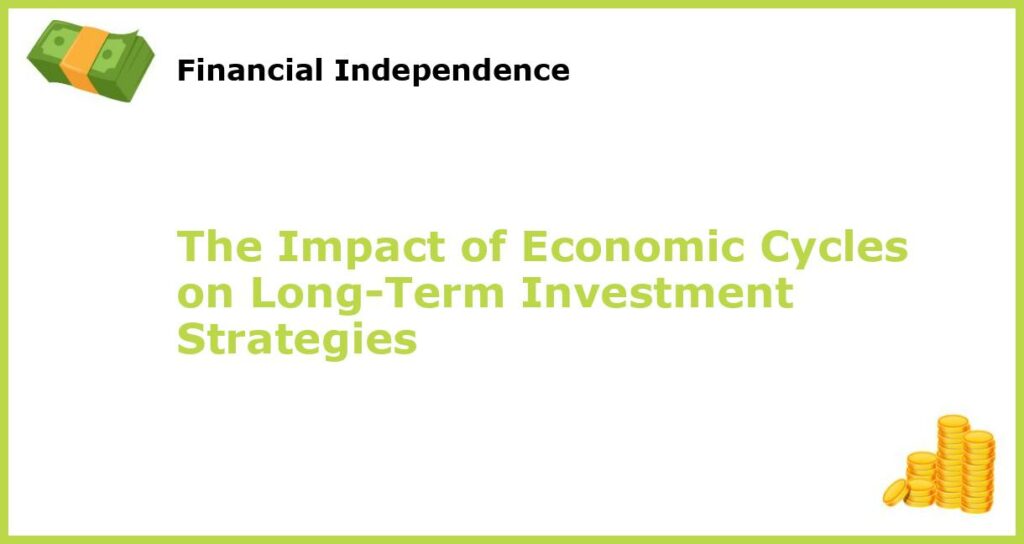Investing your money and letting it grow in the long-term is a tried and true way of achieving financial stability. However, like everything else in life, investing isn’t always as stable as we’d like them to be. One of the most significant factors that can impact investment strategies is the economic cycle. Understanding the impact of economic cycles on investment strategies is crucial in making an informed decision on how to invest your money.
Understanding Economic Cycles

Economic cycles refer to the fluctuations that occur in economic activity over time. It’s represented by four stages characterized as expansion, recession, trough, and recovery. The economy goes through various phases, each with a different level of growth, decline, and contraction. Economic cycles encompass production and employment, interest rates, and inflation rates, among other factors that affect the financial wellbeing of individuals and companies.
Expansion is characterized by increased economic activity, growth, and job creation, and lower unemployment rates. The recession marks a period of declining economic activity that leads to a drop in corporate earnings, job losses, and increased unemployment rates. The trough refers to the low point in the economic activity, while the recovery stage marks the period of economic growth, lower unemployment rates, and promising corporate earnings.
Long-Term Investment Strategies

Long-term investment strategies refer to investments that aim to accumulate wealth over a lengthy period, usually over a decade or more, and are informed by your risk tolerance level and financial goals. It is not a get-rich-quick scheme but rather an investment methodology that requires patience and discipline. While individual long-term investment strategies differ, the most common ones are stocks, bonds, and real estate.
For example, buying stock in a company allows you to become a shareholder and entitles you to receive dividends and capital appreciation upon the company’s growth. Bonds are low-risk investments that allow you to loan a company or a government money and receive interest payments in return. On the other hand, investing in real estate requires you to buy properties that generate income from rent, capital gains from property appreciation, or a combination of both.
The Impact of Economic Cycles on Long-Term Investment Strategies

The economic cycle has a substantial impact on investment strategies, and understanding how it affects each stage can help you make an informed investment decision.
Expansion
During periods of expansion, economic growth is strong, and companies generate increased corporate earnings, leading to rising stock prices. Real estate prices also appreciate during this phase. Therefore, buying and holding stocks and investing in real estate or real estate investment trusts (REITs) may be profitable. As the economy grows, companies may expand their businesses, resulting in possible dividend increases and stock valuations’ capital appreciation.
Recession
During periods of recession, companies’ and governments’ economic growth stalls, leading to decreased corporate earnings, layoffs, and increased unemployment rates. Stock prices tend to decline, while real estate prices also plummet. Therefore, when the economy is in a recession, long-term investment strategies that involve purchasing stocks or real estate tend to perform poorly. During recessions, bonds or commodities may be reasonable long-term investments.
Trough
The trough phase marks the point in which economic activity stops contracting and begins to recover. At this point, the economy may start to show modest growth, and corporate earnings may begin to rise, implying a positive long-term economic trend. During this phase, combining stocks and real estate in your investment strategy may prove profitable for long-term financial goals.
Recovery
During the recovery phase, economic activity is strong, corporate earnings are increasing, and businesses are growing. This is a period of significant investor optimism, and the value of stocks and real estate may rise in this period. It makes a perfect time for investors to invest in stocks and other shares linked to corporate growth, such as real estate investment trusts (REITs).
Diversification
Regardless of the phase of the economic cycle, it’s always important to diversify your portfolio. Diversification means spreading your investments across a range of asset classes and sectors, reducing the effect of a single asset or stock on your portfolio. In simple terms, diversification limits your exposure to significant losses by spreading your eggs across multiple baskets.
Patience
Patience is key when it comes to long-term investments. Short-term changes to your investment portfolio should not be based on short-term news or market fluctuations. The power of compound interest is critical in long-term investment strategies, and making impulsive changes may hamper the investment’s overall growth. Decisions to liquidate an investment should only be made after weighing the long-term impact of such a decision.
Professional Advice
When it comes to long-term investment strategies and understanding the impact of the economic cycle, it’s always good to seek professional advice. A financial advisor can help you create a customized investment plan that takes into account your specific investment goals, risk tolerance, and time horizon. Planning for the future is an excellent way to achieve financial well-being and consult with your financial advisor to help ensure your investment strategy progress over time.







